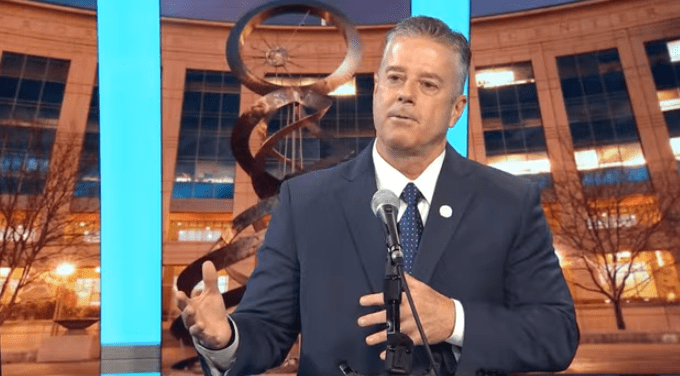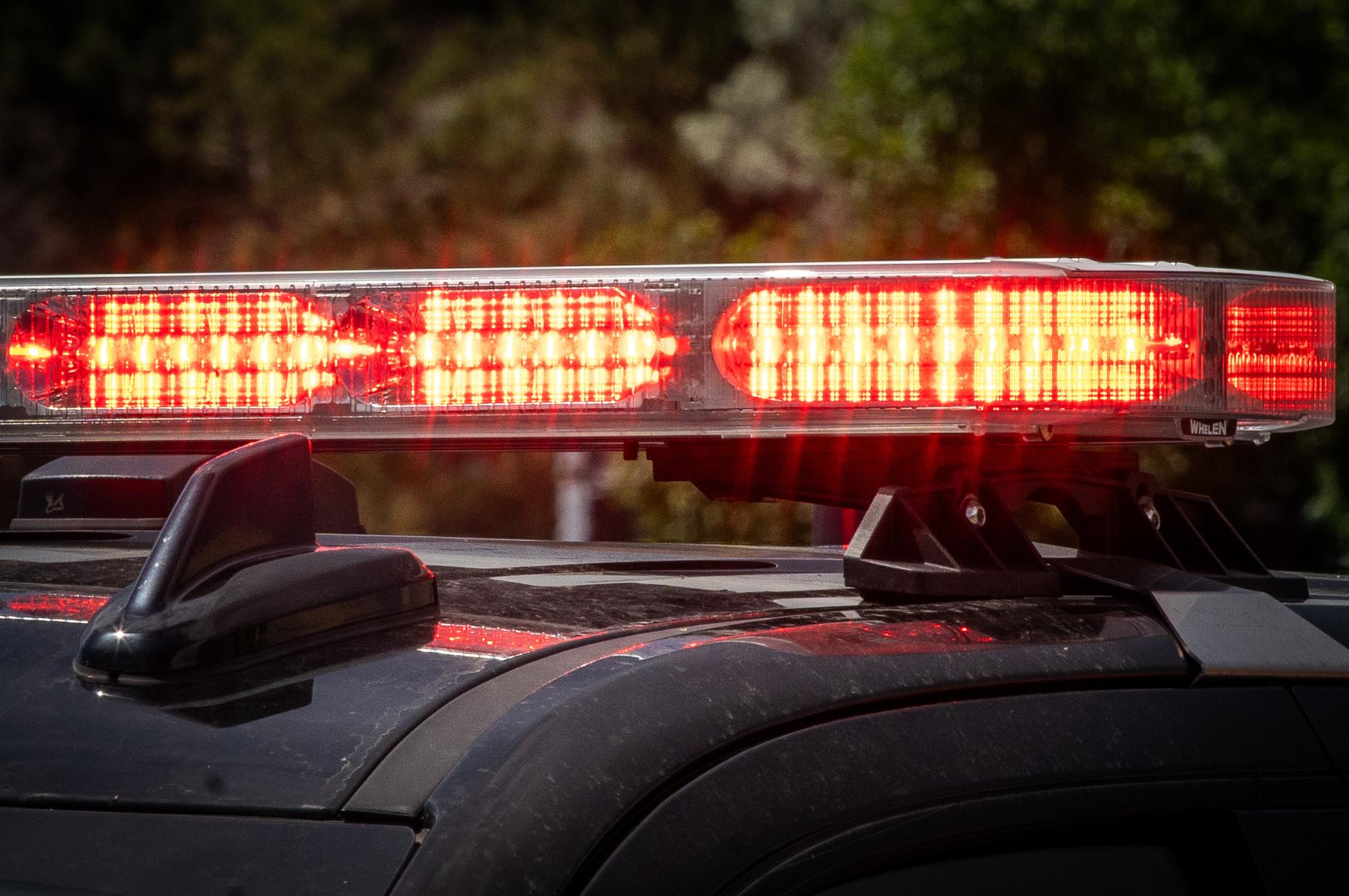
Susan Greene | Sentinel Reporter in Residence
Aurora’s council is expected Monday to formalize its appointment of Todd Chamberlain, a former commander in the Los Angeles Police Department, as the city’s new police chief.
If approved, as expected, Chamberlain will garner $250,000 a year and be the seventh person to lead the city’s beleaguered, 700-person department in five years.
Chamberlain was announced as the city’s hire on Aug. 21, precluding an opportunity for the public to weigh in on his appointment.
Meanwhile, the city also is moving forward to replace Dan Brotzman, who stepped down as city attorney earlier this summer. The lone internal finalist is Pete Schulte, a former police officer and public safety client manager in the Aurora City Attorney’s Office who made headlines in 2023 when he was choked by a man he tackled to the ground during a ride-along with then-police Chief Art Acevedo. Three other external candidates, who have not been named, also are being interviewed to lead the city’s 65-person legal department.
City officials hope to have the new city attorney on board by September, preferably close to when Chamberlain swears in as police chief on Sept. 9.
Monday’s city council agenda includes the introduction of an amendment tweaking the chain of command over — and duties of — the city’s internal auditor and internal auditing office. Instead of reporting to the city manager, as has been the case, the auditor and office would report to the city council’s Management and Finance Committee. They also would be given “authority to discuss significant and sensitive matters with city council members, including concerns with the interference of duties, without city management present.”
City officials say those changes are meant to make the internal auditor more independent. Denver has an independent auditor department headed by an elected leader.
But other proposed changes could expose the auditor to political pressures or intervention by giving the city council power over the auditor’s budget and requiring the city manager to seek input from the council when hiring and removing the city auditor and evaluating their performance and determining their pay. The ordinance also would require the auditor to notify the city council, along with the city manager, when launching an audit the office didn’t pre-plan for — one inspired, say, by unexpected suspicions of malfeasance in the city.
Also Monday, the city is introducing an ordinance that would update Aurora’s election code. Among the proposed changes is a rule preventing a recall petition from being circulated against a city official whose office is up for re-election within six months. Another change would no longer require city elections to be conducted under the requirements of both the Municipal Election Code and Colorado’s Uniform Election Code. Rather, Aurora’s Municipal Election Code — meaning the city’s own set of election policies — would take precedence, and the city clerk would have the freedom to choose “to follow the Uniform Election Code,” if desired.
In their non-voting study session with city staff beginning at 5:15 p.m., council members will discuss permanently extending mandatory minimum jail sentences for various kinds of theft in the city.
One proposal involves removing the “sunset provision,” or expiration date from an ordinance related to retail theft, which is set to end on Oct. 26 — two years after it went into effect in 2022. That proposal would make permanent the mandatory minimum sentence for shoplifting an item valued at more than $100 at least three days in jail for a first-time offense. Minimum jail sentences for second- and third-time offenders would indefinitely remain 90 days and 180 days, respectively.
The proposal also would indefinitely extend the mandatory minimum sentence for stealing food or accommodations valued at more than $15 to at least three days in jail. For people convicted of motor vehicle theft in Aurora, the mandatory minimum sentence would remain at 60 days in jail for a first time offense and at least 120 days for repeat offenses.
Failure to appear on a theft charge would continue to come with a mandatory minimum jail sentence of 10 days, if the proposal passes.
Another, related proposal would amend the city code to make it easier for city officials to track the effectiveness of the minimum retail theft sentences that council members passed two years ago. The way the code is currently written limits their ability to assess whether those sentences have deterred shoplifting, a persistent problem in the city.
Also, the council is slated Monday to discuss a plan to create a legal pathway to seize stolen shopping carts from public and private property. The city deems the presence of those carts away from the stores they belong to a “visual blight” that is “aesthetically detrimental to the community.” City officials also argue the stray carts constitute a public nuisance because of their potential to create potentially injurious “hazards for pedestrians and motorists,” “obstruct public rights-of-way, impede stormwater flow and become receptacles for trash.”
The plan would allow city officials to seize the carts while breaking up camps of unhoused people, who often use them to transport and hold their possessions. It calls for the city to develop a process whereby people who feel their shopping carts have been confiscated unlawfully may challenge the seizure.
The council also will discuss creating a program to collect and return stolen shopping carts to retailers. City officials seek to work with local stores, property owners and community groups not just to reduce the number of abandoned shopping carts, but also to “educate retailers about their responsibility to prevent shopping cart removal from their premises and to retrieve abandoned carts in a timely manner.” A team of city staff or contractors, funded partly by fees collected from grocery store bag sales, might be created to collect and return them to the proper retailers.
Also up for discussion at Monday’s study session:
- An ordinance requiring police officers to impound motor vehicles they stop if the driver does not have a valid driver’s license, vehicle registration and confirmed insurance on the vehicle. The ordinance carves out exceptions for people in emergencies or facing extraordinary circumstances.
- An ordinance preventing the public from being denied access to the Aurora Reservoir due to private or special events held there. The city currently allows individuals and organizations to reserve the entire reservoir for private or special events at any time during the year, preventing non-invitees from using the reservoir at those times. This proposal, put forth by Councilmember Danielle Jurinsky, would stop precluding others from using the reservoir during those events.
- Modifications to the city’s plan to move domestic violence cases out of municipal court and into local county and district courts, beginning in July 2025 — not January 2025, as originally proposed two weeks ago. Another modification would have the municipal court continue hearing domestic violence cases that are filed prior to July 1, 2025 through to the conclusion of those cases.
Mayor Pro Tem Dustin Zvonek has argued that the shift would save tax dollars that could otherwise be spent prosecuting, adjudicating and providing public defenders in those cases, while also exploring the future privatization of the Aurora Public Defender Office. Opponents see the move as the council’s latest attempt to gut that office. They also counter that there are not enough county judges to hear domestic violence cases, that the plan has not had sufficient public input, and that the issue should be tabled until a new judicial district is created and a new district attorney takes office, both in January. - An update on the Cherry Creek School District’s phased in mill levy increase and $950 million bond proposal. District officials will brief the council on the funding package, which the CCSD’s board voted on August 12th to put on the November 5th ballot. The plan seeks, among other things, to address more than $300 million in planned and deferred maintenance needs for CCSD school buildings, the vast majority of which are more than 20 years old; provide approximately $40 million the district says is required annually to keep up with maintenance needs; hire trained security personnel to monitor school buildings; offer healthy meals for all; provide additional mental health support for students; update technology and digital tools for students and staff; and hire “the very best teachers.”









